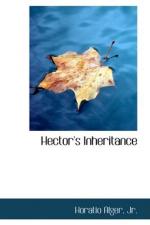Of course, he made acquaintances. Among them was a clergyman, of middle age, who was attracted by our hero’s frank countenance. They met on deck, and took together the “constitutional” which travelers on shipboard find essential for their health.
“You seem to be alone?” said the clergyman.
“Yes, sir.”
“Pardon me, but it is uncommon to meet one so young as yourself who is making so long a journey. I suppose, however, you have friends or relatives in California.”
“No, sir; I know no one, to my knowledge, in the Golden State.”
“Then, perhaps, you go out in search of employment?”
“No, sir; I go out on business.”
“You are a young business man,” said the clergyman, smiling.
“Perhaps I should rather say, on a mission.
I am sent out, by a New
York merchant, in search of his nephew, who is somewhere
in San
Francisco.”
Hector explained himself further. The minister, Mr. Richards, listened with attention.
“Certainly,” he said, “a great responsibility rests upon you. Mr. Newman must have great confidence in you.”
“I hope he will not find it misplaced,” answered Hector, modestly.
“It is certainly a compliment to you that a shrewd business man should consider you worthy of such confidence. The presumption is that he has good reason for his confidence. I think, my young friend, that you will enjoy your visit to our State.”
“Then you reside there, sir?”
“Oh, yes. I went out twenty years since; in fact, just after I graduated from the theological school. I spent a year at the mines; but, at the end of that time, finding an opening in my profession, I accepted the charge of a church in Sacramento.”
“In Sacramento?” exclaimed Hector, eagerly.
“Yes. Have you any associations with that city?”
“It is my birthplace, sir.”
“Then you are not a stranger to California?”
“Yes, sir; I came away so early that I have no recollection of the place.”
“What is your name?” asked the clergyman.
“Hector Roscoe.”
“Roscoe? The name sounds familiar to me,” said the minister, thoughtfully.
“How long since you went to Sacramento, Mr. Richards?”
“I went there in 1855.”
“And I was born there in 1856. My father and mother lived there for some time afterwards.”
“It is probable that I met them, for Sacramento was a small place then. Shall you go there?”
“Yes, sir. I have a special reason for going—a reason most important to me.”
As Mr. Richards naturally looked inquisitive, Hector confided in him further.
“You see, sir,” he concluded, “that it is most important to me to ascertain whether I am really the son of the man whom I have always regarded as my father. If so, I am heir to a large fortune. If not, my uncle is the heir, and I certainly should not wish to disturb him in the enjoyment of what the law awards him.”




